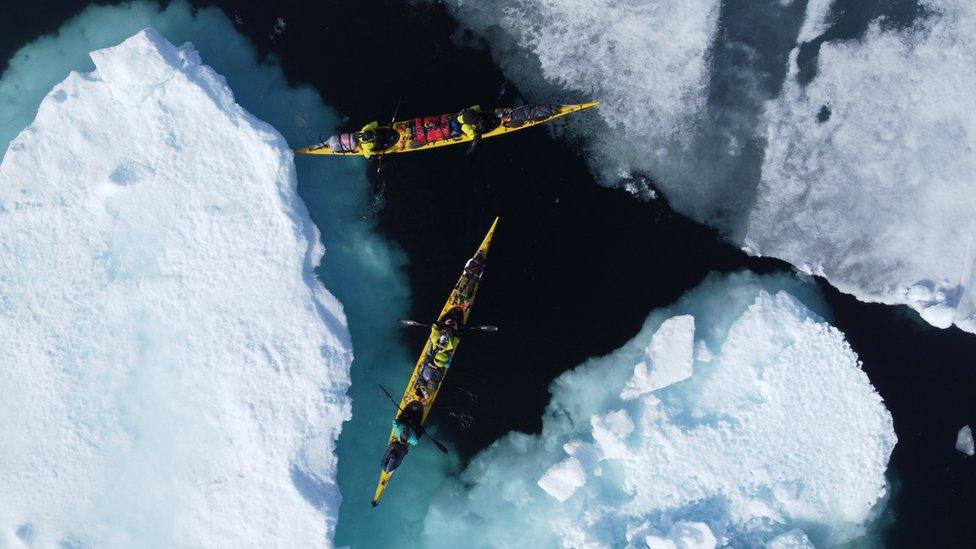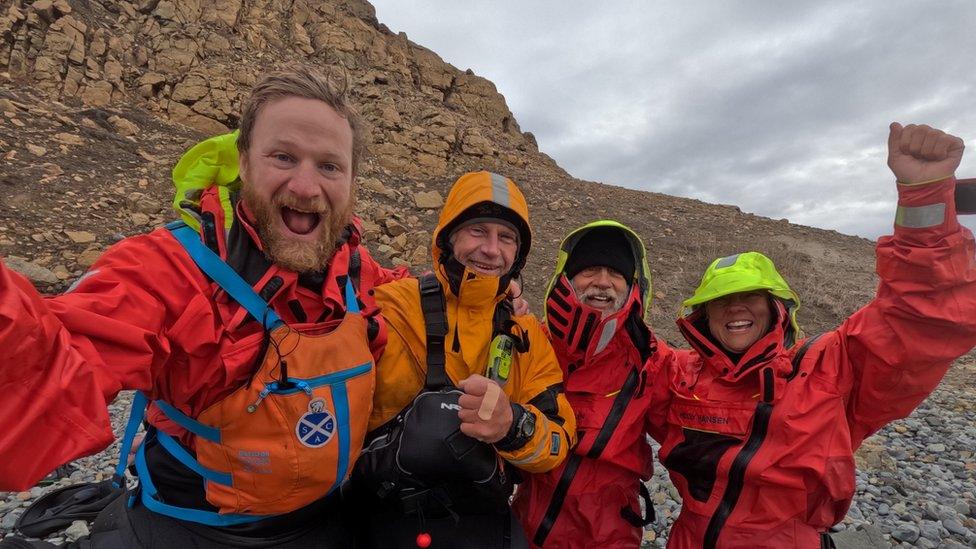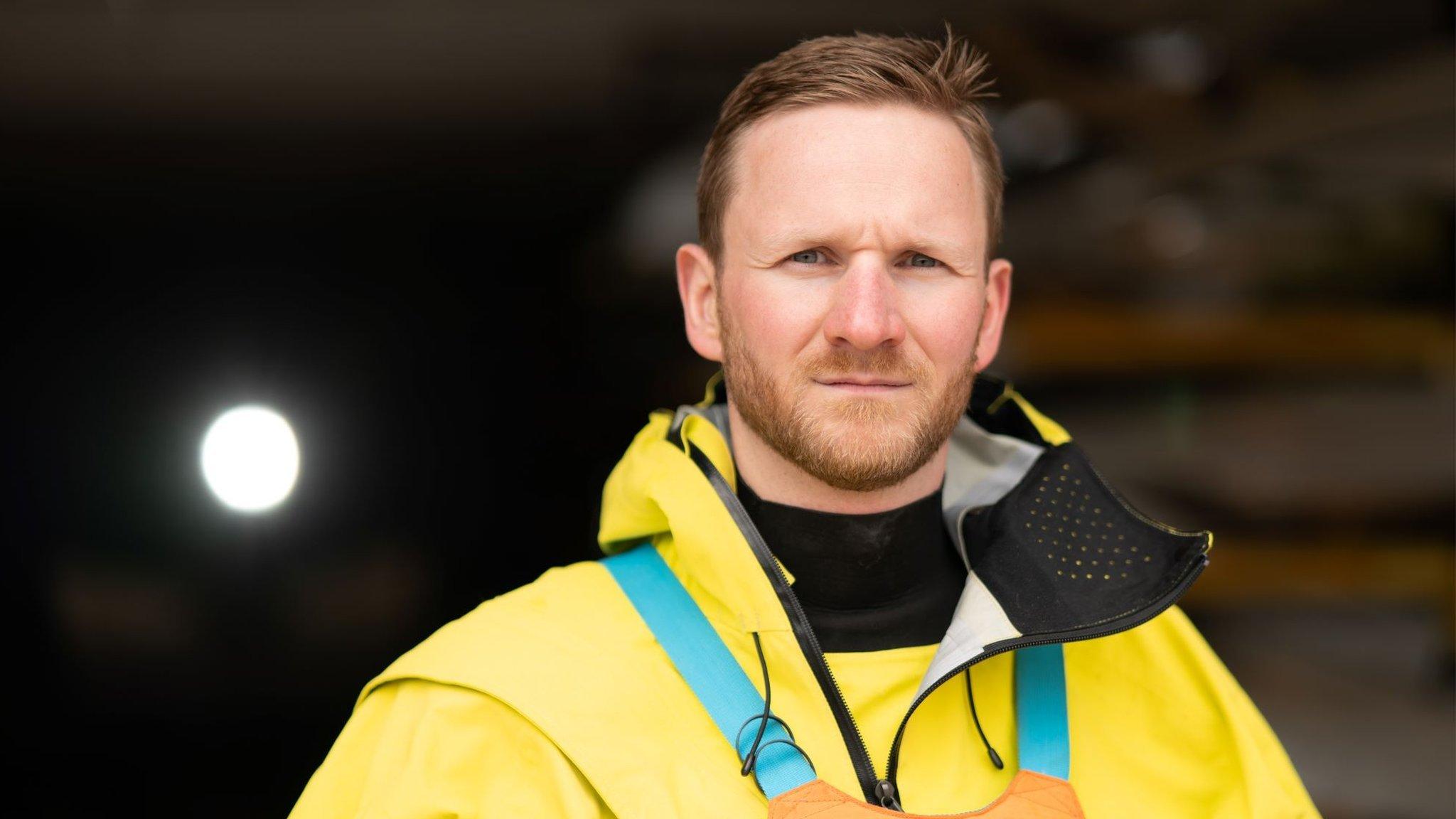Adventurer sets two world records kayaking Arctic's Northwest Passage
- Published
Mark said he had been unable to feel his feet since July due to the freezing Arctic temperature.
An adventurer from Edinburgh has set two world records by kayaking the Arctic's Northwest Passage.
Mark Agnew began the 2,000 mile journey from Baffin Bay, Greenland, in July, and completed it three months later.
One of a team of four, the 32-year-old endured harsh weather, including 15ft (4.57m) waves, and an encounter with a polar bear.
He said he had been unable to feel his feet since July due to the freezing Arctic temperature.
Mark has raised over £7,000 for an outdoors education charity and he hopes to raise up to £25,000.
He completed the Northwest Passage with three Americans - expedition leader West Hansen, Jeff Wueste and Eileen Visser.
The team set two world records for being the first to kayak the Northwest Passage and the first to complete the entire route under human power.
On 2 July, Mark and his team set off from Baffin Bay, Greenland, and reached the Beaufort Sea on 8 October.
"Every singe day was tough and what surprised me was how varied the challenges were," Mark said.
"The biggest challenge was the sea ice. We were trying to start early so we could finish before the winter returned, which meant we started when there was still a lot of frozen ocean.
"We became trapped in the ice a lot. There was this one occasion in particular where we were trapped in the ice and two icebergs began to ram together with us in between. I thought we were going to be crushed to death."

During the expedition, the team faced many weather challenges including drifting ice
On another occasion, a polar bear pressed against his tent, causing Mark to sprint outside in his pyjamas.
"I shouted at the bear and threw stones as the others came to the tent. But all our attempts to scare the bear didn't work - it just stood there. We were running out of ideas," he said.
"It was an amazing but terrifying encounter. Finally, the bear just turned and sauntered off."
Previously, Mark had failed twice to row the Atlantic, in 2016 and in 2018. He was rescued during both attempts.
Afterwards, he faced a mental health crisis but said kayaking helped him overcome this.
The route the team followed was the same as Sir John Franklin's doomed voyage in 1845.
Both ships involved in the exploration became ice bound and Franklin and his crew of 129 men on HMS Erebus and HMS Terror were lost.
Now, 178 years later, the Arctic's ice conditions have changed due to climate change, making the journey possible.
To keep up their strength, the team members each consumed between 4,000 to 6,000 calories per day in the form of powdered meals mixed with water, but this led to other challenges.
"They froze and suddenly we couldn't drink them. At one point, Eileen and I had to do a round trip of four hours to find a pond that wasn't completely frozen through. We had to break through the surface of it with an axe and then walk back.
"Suddenly everything was a challenge.
"I haven't felt my feet since July. I'm told I won't feel them again for another month or so," he said.

Mark(left) and his kayaking team after completing the expedition
Mark grew up in Edinburgh with parents who helped kindle his love of adventure.
His father mapped part of Greenland and Patagonia, and his mother spent time travelling overland from Australia back to the UK.
When Mark crossed the Northwest Passage "finish line", he was overwhelmed with pride and gratitude to those who had helped and inspired him.
"I just thought about my wife and everything she did to make this possible.
"This didn't happen in a vacuum because I believed in myself, this happened because of my parents so I thought about them. I thought about so many different people and I was just completely overwhelmed.
"A lot of people say they come back from expeditions and they have a post-expedition blues you know, 'what next? what now?'.
"Modern life feels so pedantic compared to real challenges they face. But I don't have that. I just feel so content. We did something special."
Mark has raised over £7,000 for Wilderness Foundation UK, a charity offering education and therapy programmes for young people and adults to help them reconnect to society and to themselves through outdoor adventures, therapy and mentoring.
Wilderness Foundation UK's chief executive Jo Roberts, said: "As a charity we work with children, teens and adults whose fears hold them back from trying, failing and succeeding - and they get stuck. Mark has set them an example of what it looks like to give life 'a go'."
Related topics
- Published20 June 2023
